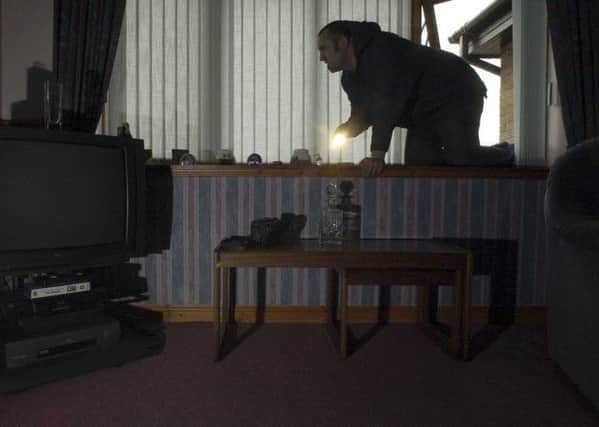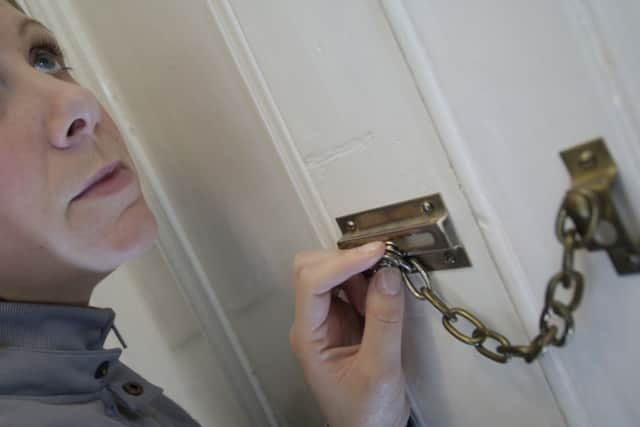How to keep your home safe from burglars


IT is where we should feel safest – within the walls of our own home.
But according to a new report, for many home is no longer our private “castle”. Instead, it’s a crime scene, invaded by thieving strangers, our most private places raided and precious personal belongings spirited away.
Advertisement
Hide AdAdvertisement
Hide AdA new insurance claims study puts areas of Edinburgh in the top ten hot spots in the country for housebreakings, with homes in Balerno, Currie and Wester Hailes – which cover the EH14 postcode – at the top.


Price comparison site MoneySuperMarket examined more than 2.68 million home insurance quotes over the past year and found the Edinburgh postcodes topped the list of places most likely to have made a claim for theft from their home or garden.
The EH14 area had 32.5 burglary claims per 1000 quotes. It was followed by the EH4 area – covering Dean Village, Comely Bank and the A90 to Barnton and Cramond – which had 30 claims per 1000.
For their victims, the impact can be devastating. According to Victim Support Scotland, many elderly victims in particular struggle to ever get over the emotional turmoil of having their home and privacy invaded.
Advertisement
Hide AdAdvertisement
Hide AdOthers, like dad-of-three Andrew Wilson, whose Balerno home was broken into just before Christmas, find themselves grappling for weeks trying to sort out insurance complications and other paperwork.
“I’d be lying if I didn’t say there have been a couple of nights where I’ve found it more difficult than normal to sleep,” he admits.
“I suppose I was quite lucky, my keys were on the table, they got a lot of valuables and the cars relatively easily. The worst thing would be to know they had crept around the house looking for things.”
The thieves struck overnight while he and his children slept. He woke to find no obvious sign of entry, the car keys missing and his cars gone, his iPhone and cash stolen.
Advertisement
Hide AdAdvertisement
Hide Ad“The police handling of it all was very good. The frustrations and the overwhelming part has come from dealing with the insurers,” he says.
“After speaking to six different firms handling the one car claim, I reckon I made around 80 phone calls and wasted days of time.”
Last year a disbanded police housebreaking hit squad was restored after a spike in break-in incidents.
Police claim there has been a 10.3 per cent reduction in domestic housebreaking since April 2014 alongside an 11 per cent increase in detections. No-one from Police Scotland was available for interview.
Advertisement
Hide AdAdvertisement
Hide AdSo just how can we protect our homes from unwanted visitors?
WHERE TO START?
Police Scotland say we should look at our home as a series of layers – the more layers an intruder has to overcome, the harder it will be to break in, the longer it takes and the less likely they are to try.
Think first about the perimeter of your property and how to make it as hard as possible to penetrate.
Keep hedges, walls and fences less than four feet high if possible, it’s harder for an intruder to work unseen.
Advertisement
Hide AdAdvertisement
Hide AdIf you do have higher fences, consider fitting a topping like a trestle or Prikka Strip to make it harder for someone to climb over.
Nature can provide its own defences in the form of prickly shrubs or thick thorny bushes.
Be wary of where you install security lighting – you could end up illuminating a hidden spot which will simply benefit a thief.
And be aware of where you store bins which could be used as a means to climb over a high fence or access windows.
Advertisement
Hide AdAdvertisement
Hide AdFinally, keep garden tools or implements locked away, especially ladders which could be useful for breaking into your home.
PROTECTING YOUR BELONGINGS
Many break-ins are opportunist – the thief hasn’t had to actually break in because a door or window has been left open or unlocked.
The simplest way to prevent that is to lock up at all times.
Avoid leaving keys on the inside of door locks, under mats or anywhere that they can easily be found.
Advertisement
Hide AdAdvertisement
Hide AdSeparate car keys from house keys. Tuck your car keys in a hidden spot so if someone does break in, at least they can’t also make off with your car.
Likewise, keep handbags and wallets out of sight.
Avoid keeping large amounts of cash in the house. If you must, then disperse it in various locations. Invest in a UV marker pen to place an invisible imprint of your postcode and house number on your possessions.
Record details of your valuables, such as mobile phone, cameras, laptops and tablets on the national mobile property register at www.immobilise.com.
Keep a note of the 15-digit IMEI number on your phone, it is unique to your device. To find it, dial *#06# on your mobile phone.
AVOID LEAVING CLUES
Advertisement
Hide AdAdvertisement
Hide AdThink like a thief might – check your property for obvious clues which could reveal when your home is empty or what valuables you have.
Don’t leave expensive items or valuables in sight of windows. Little things like placing a wall calendar near a window – with holiday dates or hospital appointments written in – could give clues as to when the house is likely to be empty.
And while recycling is to be encouraged, avoid leaving packages and boxes outside your house which advertise the fact you’ve just invested in an expensive new electronic toy. Tuck them out of sight, fold them up or tear into pieces instead.
TOUGHEN UP
A few simple adjustments to your doors and windows could help put off a potential housebreaker.
Advertisement
Hide AdAdvertisement
Hide AdSingle-glazed windows on a ground-floor property are vulnerable as plain glass is easy to break. Consider replacing with laminated glass – two pieces of glass bonded with a sheet of laminate.
Doors should ideally be fitted with a quality five lever mortice deadlock and the frame should be strong enough to support the door, hinges and lock. Consider fitting additional mortice bolts at the top and bottom of the door and if practical, hinge-bolts give additional resistance. Consider fitting a door viewer and a door chain. Avoid leaving keys in the door – they can be turned or stolen through the letterbox.
PLAN AHEAD
If you’re going away and your home is going to be empty, take steps to help ensure it’s safe. Get to know your neighbours or ask family members to watch your home, drawing the curtains and clearing away post.
Tempting as it is to brag on social media that you’re off on your dream holiday, don’t – it could alert potential housebreakers that your home is empty.
Advertisement
Hide AdAdvertisement
Hide AdUse timers on lights and if you have an alarm then make sure it’s set. Dial 101 and let the police know you’ll be away so that local officers are aware.
Check if there’s a Neighbourhood Watch scheme in your area and get involved. Local community policing teams – available by dialling 101 – can also give advice.
AND IF THE WORST HAPPENS?
Act quickly and contact the police on 101. If you suspect an intruder is still in your home, dial 999.
Afterwards, make a list of all stolen items and any damage and pass to police. You may later discover further items missing or other damage. Remember to update police with this information, it’s important if someone is caught and convicted, as they may be ordered by the court to pay you compensation for your loss.
Advertisement
Hide AdAdvertisement
Hide AdLet your bank or credit card company know immediately of any cards or cheque books that have been taken. Contact the Benefits Agency and Housing Department about replacing stolen pension, benefits or rent books. Theft of official documents, such as passports or driving licences should be notified to the issuing authorities as soon as possible. If you are a tenant, your landlord, the council or housing association should arrange emergency repairs.
If you are a homeowner, let your insurance company know straight away.
DEALING WITH THE AFTERMATH
According to Victim Support Scotland, people react in different ways to having their home broken into.
Some accept it and move on, treating it as an irritating inconvenience. Others can struggle to come to terms with what has happened.
Advertisement
Hide AdAdvertisement
Hide Ad“There’s no template for how people will respond,” says David Sinclair, spokesman for Victim Support Scotland.
“Some people take it in their stride. Others, particularly elderly people, feel their home has been violated and effectively live in fear for the rest of their lives, frightened to leave their home, frightened as to the level of security they have. In cases like that, Victim Support Scotland can help.”
It’s not unusual to feel angry or insecure. And it’s natural to ask ‘Why me?’, he adds.
“It’s worth remembering that in many cases housebreaking is either professionals at work or an opportunist crime and it’s nothing ‘personal’, it just happened to be their home.
Advertisement
Hide AdAdvertisement
Hide Ad“However we do warn people that in many instances when someone’s home has been broken into, it’s likely that it will be broken into again.”
Victims often wrestle with feelings of not being able to cope with what’s happened. “There’s the clearing up the aftermath, making the house secure, dealing with the paperwork, it can be overwhelming,” he adds.
Victim Support’s trained volunteers help guide clients through what has happened and how to cope. And it can advise on where to get financial help, support victims through any court procedures, advise on any criminal injuries compensation and give crime prevention advice. For more, go to www.victimsupportsco.org.uk or call 0345 603 9213.